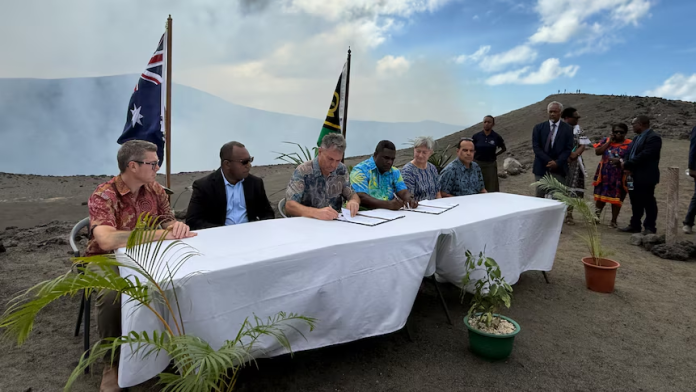Following months of negotiations, Australia and Vanuatu finalised a decade-long security and economic agreement valued at A$500 million (US$328 million) and termed the Nakamal Agreement, the BBC reported.
Announced on Wednesday, the pact aims to fundamentally transform bilateral ties, with Australian Deputy Prime Minister Richard Marles declaring:
“We are family. Our future is very much bound together,” he said.
Vanuatu’s Prime Minister Jotham Napat characterised the deal as a “win-win situation” for both nations, highlighting mutual benefits in security cooperation and economic transformation.
While full details remain undisclosed, the Australian Broadcasting Corporation reports the agreement will fund two major data centres in Port Vila and Santo alongside substantial climate resilience initiatives for the low-lying archipelago.
Millions will be poured into addressing climate impacts and enhancing national security infrastructure. Though visa-free travel for Ni-Vanuatu citizens was initially discussed as a cornerstone provision, Napat confirmed this element would be addressed in a separate “subsidiary agreement” pending finalisation.
Scheduled for formal signing in September, the agreement advances Australia’s strategy to bolster regional influence amidst growing Chinese engagement in the Pacific. The deal follows Canberra’s recent security pacts with Solomon Islands, Tuvalu, and Papua New Guinea.
Notably, a similar Australia-Vanuatu agreement collapsed in 2022 when Vanuatu’s former leader withdrew over security concerns at the eleventh hour.
At a symbolic press conference beside Tanna Island’s volcano, Marles emphasised the “shared destiny” and “shared security environment” underpinning the partnership. Foreign Minister Penny Wong reinforced the long-term vision:
“The most important thing is where we will be [in] three and five and ten years,” she stated.
Napat confirmed the deal includes “financial support” and “mobile labour mobility” provisions, though reciprocal commitments from Vanuatu remain unspecified.
